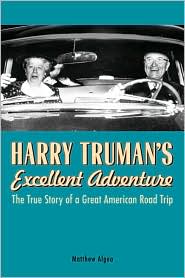 Harry hits the road:
Harry hits the road:In this lively history, author Matthew Algeo meticulously details how Truman’s plan to blend in went wonderfully awry. Fellow diners, bellhops, cabbies, squealing teenagers at a Future Homemakers of America convention, and one very by-the-book Pennsylvania state trooper--all unknowingly conspired to blow his cover. Algeo revisits the Trumans’ route, staying at the same hotels and eating at the same diners, and takes readers on brief detours into topics such as the postwar American auto industry, McCarthyism, the nation’s highway system, and the decline of Main Street America. By the end of the 2,500-mile journey, you will have a new and heartfelt appreciation for America’s last citizen-president.
Interesting! I just heard about his road trip the other day, but I didn't know it was a book.
ReplyDeleteI was struck by the way Truman could just pack up and go tour the country. Now I wish I could remember what it was I heard. It had something to do with places he really liked or didn't or where he would stay. I'll have to try to google it out of my brain.
What are others reading while they wait on Team of Rivals?
(The book is fascinating by the way. What an interesting approach she takes -- sort of an exercise in compare and contrast.)
I'm reading THE FIRST TYCOON---Cornelius Vanberbilt----all 570 pages of text and with a load of footnotes. Its really detailed (kinda bogs down in spots) but well worth the read.
ReplyDeleteHST was last president who truly was "one of us." It doesn't strike me as odd that he would hop in his own car a drive off to anywhere. What I always found funny were the reactions of people to seeing him behind the wheel--like stunned gas station attendants. Truman used to get a kick out of the reactions.
Interesting! I read Cannadine's bio of Mellon for some strange reason (mostly because I like Cannadine), and found it fascinating.
ReplyDeletePlus, I didn't know that Mellon was responsible for the National Gallery and the architectural development of the Federal Triangle area, which made him even more interesting outside all the financial machinations that he was involved with.
I was tempted after that to read the bio of Carnegie, which came out around the same time and I think you recommended, but never got to it.